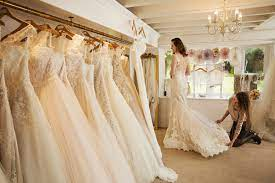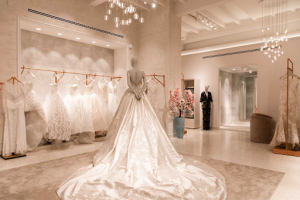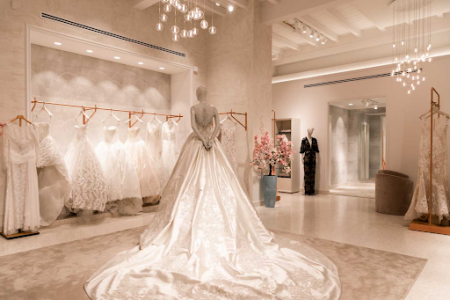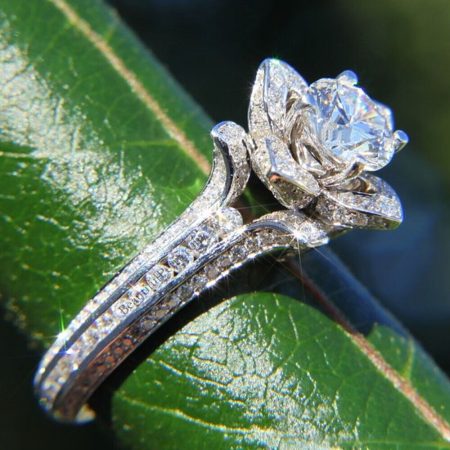Introduction to Bridal Tailoring in Dubai
Why Dubai is a Global Bridal Fashion Hub
Dubai isn’t just famous for its glitzy skyscrapers and luxury cars it’s also one of the most stylish cities in the world when it comes to bridal fashion. For brides-to-be looking for the perfect wedding gown, there’s no better place to find tailors who understand the meaning of bespoke, glamour, and cultural richness.
The Bridal Tailoring Dubai thrives because it sits at the intersection of global influence and traditional opulence. Picture this: luxurious fabrics flown in from Italy, French lace that whispers elegance, Swarovski crystals that dazzle like Dubai’s skyline all masterfully sewn together by skilled tailors from all over the world. Here, your dream dress isn’t just a possibility it’s practically a guarantee.
What makes Dubai particularly appealing is its fusion of East and West. From modest yet regal abayas with bridal flair to modern, runway-inspired gowns, this city serves every taste imaginable. And because the city caters to an international crowd, you’ll find tailors who are experts in every kind of wedding gown—be it Western white dresses, traditional South Asian lehengas, or even African-inspired bridal couture.
The Cultural Fusion in Bridal Tailoring Styles
Dubai’s tailoring industry mirrors its multicultural population. A bride in Dubai has access to artisans who can stitch the sophistication of European elegance with the intricate craftsmanship found in Middle Eastern, South Asian, and African wedding attire. Want a gown with Arabic embroidery, Indian zari work, and a French silhouette? That’s the Dubai difference.
This cultural variety means every bride can feel seen, celebrated, and styled perfectly for her big day. Whether you’re planning a traditional Emirati wedding or a beach ceremony with a minimalist dress, Dubai’s tailors can make your vision come to life.
Understanding the Importance of Custom Bridal Tailoring
Off-the-Rack vs. Custom Bridal Gowns
If you’ve ever tried on a wedding dress straight off the rack, you probably know that one size definitely does not fit all. Bridal shops may offer beautiful options, but they often come with limitations—be it size, fabric, or detail. This is where custom bridal tailoring makes all the difference.
Custom bridal tailoring isn’t just about fitting your body—it’s about fitting your personality, your story, and your vision. Off-the-rack dresses are made with standard sizing and generalized body proportions, while a tailored dress is created to hug your curves, support where needed, and flow exactly how you want it to. It’s the difference between a dress that works and a dress that wows.
More importantly, when you go custom, you’re in the driver’s seat. You choose the neckline, sleeves, length, fabric, color, and embellishments. Want a dramatic cathedral train? Or maybe a backless gown with pearl detailing? No problem—custom tailoring makes it possible.
Benefits of Bespoke Bridal Tailoring
- Perfect Fit: Your dress is crafted to your exact body measurements. No loose shoulders or awkward waistlines here.
- Unique Design: No two brides are the same, and neither should their dresses be. A tailored gown reflects you—your style, your taste, your vibe.
- High-Quality Craftsmanship: Bridal tailors in Dubai are known for their meticulous attention to detail. Hand-sewn beading, custom lacework, and intricate stitching all contribute to a gown that feels like couture.
- Personalized Experience: You’re not just buying a dress—you’re part of the creation process. You get to see your dream dress evolve from sketch to final fitting.
- Emotional Connection: When you walk down the aisle, there’s something incredibly special about knowing your dress was made just for you.
Key Features of Bridal Tailoring Services in Dubai
Fabric Selection and Embellishment Customization
Dubai is all about luxury, and bridal tailoring is no exception. One of the first steps in the tailoring process is fabric selection. Brides are often overwhelmed—in a good way—by the sheer variety available. Silk satin, chiffon, organza, tulle, crepe, lace, and velvet—the options are endless. And then there are the embellishments: think Swarovski crystals, hand-sewn pearls, delicate sequins, and ornate beadwork.
Tailors in Dubai often have access to high-end fabric suppliers from Europe, Asia, and the Middle East. Many boutiques even have exclusive fabric collections, giving you access to materials you won’t find anywhere else in the world.
Customization doesn’t stop at fabrics. Brides can tweak every tiny detail of their gown—from the hemline length and neckline shape to the embroidery pattern and zipper style. Want your fiancé’s initials stitched into your veil? Done. Prefer gold instead of silver sequins? They’ve got it. No detail is too small in Dubai’s bridal tailoring scene.
Precision Fittings and Multiple Alteration Rounds
A hallmark of quality bridal tailoring is the fitting process. Tailors typically schedule 2 to 4 fitting sessions to ensure the dress fits flawlessly as your body changes in the lead-up to the wedding. Maybe you lose a few pounds, or maybe you decide to switch from heels to flats—either way, your tailor is ready to adjust.
Each session is detailed. They check seam lines, fall length, bust support, armhole comfort, and overall balance of the gown. The goal? No last-minute surprises. You’ll walk down the aisle knowing your dress is fitted to perfection.
Popular Bridal Tailoring Trends in Dubai
Emirati-Inspired Wedding Dress Designs
The traditional Emirati bride often wears a richly embroidered gown with elaborate gold and silver threadwork. Think luxurious, flowing silhouettes made from silk or velvet, often paired with a beautifully draped shayla (veil). Tailors in Dubai excel at creating modern takes on these classics, blending tradition with subtle touches of Western styling.
You might see designs with a modest high neckline but a dramatic train, or long sleeves with sheer lace inserts that give a modern twist without compromising on elegance. Embellishments like Arabic calligraphy embroidered into the train or personalized motifs inspired by family heritage are also trending among local brides.
Western Influence in Modern Dubai Bridal Fashion
At the same time, Western bridal fashion has a strong presence in Dubai. Mermaid silhouettes, A-line gowns, and strapless bodices are extremely popular among brides who want a touch of Hollywood glamour. Dubai’s multicultural crowd has embraced styles seen in Paris, New York, and Milan—but with a bit more sparkle.
Some tailors specialize in dramatic, fashion-forward gowns that look straight off a couture runway. Think illusion bodices, detachable overskirts, plunging necklines, and architectural ruffles. These gowns are designed for the bride who wants to make a bold, unforgettable statement.
Choosing the Right Bridal Tailor in Dubai
Top Qualities to Look for in a Bridal Tailor
Selecting a bridal tailor isn’t a decision you make lightly. Your wedding dress is arguably the most important outfit you’ll ever wear, so finding the right expert to bring your vision to life is crucial. But with so many options in Dubai, how do you choose? Here are the top qualities that distinguish the best from the rest:
- Experience and Specialization: Bridal tailoring isn’t like hemming pants—it’s an art form. Choose someone who specializes in bridal couture. Look for years of experience, a diverse portfolio, and glowing reviews from real brides.
- Attention to Detail: Precision is everything in bridal tailoring. From symmetrical lace placement to perfectly aligned seams, the best tailors have an eagle eye for detail. This skill ensures your gown looks flawless from every angle.
- Communication Skills: A good tailor listens as much as they advise. They should be open to your ideas, clear in their suggestions, and respectful of your vision. Avoid anyone who insists on their own style over yours.
- Flexibility and Patience: Bridal tailoring takes time and multiple fittings. Your tailor should be accommodating with appointments and patient as your preferences evolve throughout the process.
- Portfolio Variety: Ask to see previous work. Whether you want a minimalist satin slip dress or a princess-style ballgown, your tailor’s portfolio should reflect versatility and a wide range of design abilities.
Choosing someone with these qualities means less stress, more trust, and a dress that’s as unforgettable as your big day.
Questions to Ask Before Booking a Consultation
Before you commit, sit down for a consultation. This is your chance to feel things out. Here are a few must-ask questions:
- Can I see your bridal portfolio?
- How many fittings will I need?
- What is the estimated timeline for completion?
- What fabrics and embellishments do you recommend?
- What happens if I gain/lose weight before the wedding?
- Can you replicate a design I found online or in a magazine?
- Do you provide alterations post-wedding?
- What are your payment terms?
These questions help you understand how organized, transparent, and experienced the tailor truly is. And always trust your gut—if something feels off during the consultation, keep looking.
The Bridal Tailoring Process Step-by-Step
Initial Consultation and Design Concept
The bridal tailoring process in Dubai begins with a consultation, and this first step sets the tone for your entire dress journey. Expect this meeting to last 1–2 hours. You’ll sit down with the tailor (or designer), discuss your wedding theme, venue, dress inspiration, and personal style.
You’ll often be asked to bring:
- Reference photos or Pinterest boards
- Fabric preferences (if any)
- Wedding date and timeline
- Budget range
Once the tailor has a clear understanding of your vision, they’ll sketch out a few designs and recommend fabric and embellishment options. Some tailors even provide a 3D visual or prototype mock-up so you can better visualize the final look.
If you approve the design, the next step is taking your measurements. This is detailed and may involve over a dozen different body points—neck, bust, waist, hips, arms, back length, and more. This ensures the dress fits like a second skin.
Fittings, Alterations, and Final Touches
The number of fittings you’ll need depends on the complexity of your gown. Most custom bridal tailoring in Dubai includes at least three fittings:
- The First Fitting: The dress is partially constructed—called a muslin or toile—and is adjusted for basic shape and fit. You’ll discuss changes and begin tweaking the silhouette.
- The Second Fitting: Now made with your chosen fabric, the dress will be nearly complete. This fitting focuses on details—hemlines, neckline, bust fit, sleeve comfort, train length, and accessory pairing.
- The Final Fitting: You’ll try the finished gown with your actual shoes and undergarments. Any last-minute adjustments are made, such as refining the fit or smoothing seams.
Throughout the process, Dubai tailors often allow open communication. Want to add lace to the hem last-minute? Change the sleeve length? Many tailors in Dubai will accommodate changes well into the process—just ensure you communicate early.
Some high-end tailors even offer a bridal dressing service on your wedding day, where they assist in steaming, lacing, and dressing you in your gown.
Budgeting for Bridal Tailoring in Dubai
Average Pricing for Custom Bridal Gowns
Let’s talk numbers. Dubai is known for both affordable custom tailoring and high-end couture, so costs vary widely depending on your preferences. Here’s a general pricing guide:
| Dress Type | Price Range (AED) |
| Simple Tailored Gown | 3,000 – 6,000 AED |
| Mid-range Designer Custom | 7,000 – 15,000 AED |
| High-End Couture (with handwork) | 20,000 – 80,000+ AED |
The biggest price influencers are:
- Type of fabric (silk and French lace are pricier)
- Embellishments (hand-beading, Swarovski crystals)
- Complexity of design (multi-layer skirts, embroidery)
- Tailor or designer’s reputation
If you’re a bride on a tight budget, you can still find skilled tailors who offer high-quality work without breaking the bank. The key? Know what you want and be upfront about your budget.
Tips to Get Luxury Within Budget
- Limit Embellishments: Less sparkle = lower cost.
- Choose Local Fabrics: Imported fabrics cost more. Local alternatives offer similar quality.
- Simplify the Design: Stick to clean lines and timeless silhouettes. Minimalist gowns are trending anyway.
- Go for Mix-and-Match: Some brides get bodices and skirts tailored separately, which can reduce cost and increase style options.
- Book Early: Last-minute work usually comes with rush fees.
Custom doesn’t always mean expensive. With smart decisions, you can get a luxurious, tailored gown that feels five-star—without spending like royalty.
Luxury Bridal Tailoring Boutiques to Explore in Dubai
Local Designers Who Are Making Waves
Dubai’s bridal tailoring scene isn’t just about global brands—it’s also home to incredibly talented local designers. Names like Mona Al Mansouri, Amato Couture, and Zainab Al Qasimi have become iconic for their luxurious, culturally rich, and trend-setting bridal designs.
Many of these designers have their own ateliers, where brides can book exclusive appointments and experience couture-level service. Expect signature silhouettes, elaborate details, and fabrics you’ve only seen in movies. They combine traditional Arabic aesthetics with global fashion trends, creating gowns that are one-of-a-kind.
Supporting local designers also means quicker turnaround times and more direct communication. These designers often use ethically sourced materials and employ local artisans—a great choice for the socially conscious bride.
International Bridal Fashion Houses in Dubai
Dubai is home to a number of internationally acclaimed bridal labels as well. You’ll find flagship stores for:
- Pronovias
- Vera Wang
- Oscar de la Renta
- Marchesa
- Galia Lahav
- Rosa Clará
Many of these labels offer tailoring and customization services, either in-store or through recommended local tailors. The combination of a globally renowned design and Dubai’s tailoring expertise is truly unbeatable.
For brides who dream of wearing a dress straight off the runway, Dubai gives you that opportunity—and often at more competitive prices than Europe or the U.S.






